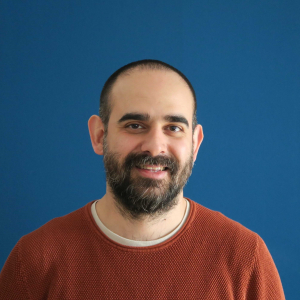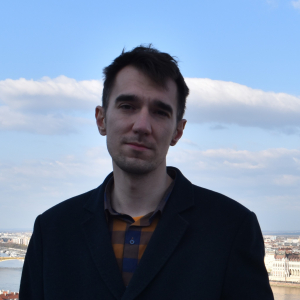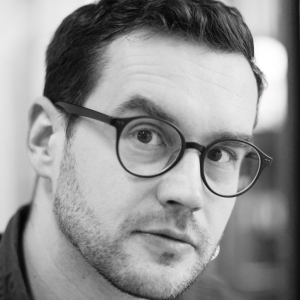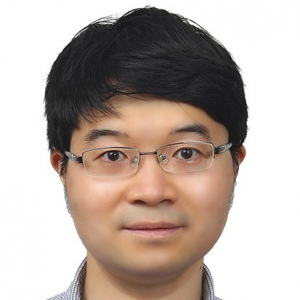Die Stipendiat:innen 2024
Ercan Akyol, PhD
Dr. Stanisław Boridczenko
Lukáš Kubík
Forrest Cale McSweeney
Sanjiao Tang, PhD
Stipendiat:
Ercan Akyol, PhD
Kontextualisierung der frühneuzeitlichen osmanischen Kulturgeschichte
Mein Projekt mit dem Titel Kontextualisierung der frühneuzeitlichen osmanischen Kulturgeschichte, versucht, die beruflichen und literarischen Beziehungen der osmanischen Gelehrten, Bürokraten und Dichter der frühen Neuzeit in ihren historischen Kontext zu stellen. Anhand eines breiten Spektrums von Archivdokumenten sowie einer umfangreichen Sammlung von Manuskripten und Briefen untersucht meine Studie, wie sich die osmanische Elitekultur durch die Interaktionen zwischen Staatsbeamten, Gelehrten, Gönnern, Protegés, Feinden, Freunden und Schriftstellern/Dichtern entwickelte. In diesem Zusammenhang wird die Sammlung frühneuzeitlicher osmanischer Handschriften der Staatsbibliothek Berlin das Kernmaterial meines Projekts bilden. Durch diese Sammlung werde ich untersuchen, wie die osmanische Schriftproduktion, einschließlich Texten aus den Bereichen Literatur, Geschichte, Medizin usw., die Elitenkultur durch soziale, emotionale, intellektuelle und berufliche Interaktionen prägte.
Über den Stipendiaten
Ercan Akyol (PhD) ist Senior Lecturer für Turkologie an der Universität Wien. Seine Forschungsschwerpunkte liegen im Bereich der frühneuzeitlichen osmanischen Kulturgeschichte. In seiner Dissertation beschäftigt er sich mit der osmanischen Literaturkultur des frühen 17. Jahrhunderts. Im Rahmen seiner Dissertation interessiert er sich besonders für die Literaturgeschichtsschreibung, die osmanische Paläographie, die Manuskriptkultur und die Kontextualisierung der frühneuzeitlichen osmanischen Literatur. Er hat verschiedene Artikel und Lexikoneinträge zur modernen türkischen und frühneuzeitlichen osmanischen Geschichte, Literatur und Kultur veröffentlicht.
Stabi Collections
- Münşeat-ı Nadiri – Ms. or. oct. 2122
- Münşeat-ı Nergisi – Ms. or. oct. 3680
- Münşeat – Ms. or. oct. 2632
- Fazilet-i Şam – Ms. or. fol. 3332
- Ahkam-ı Nücum – Ms. or. oct. 2734
- Kıyafetname – Ms. or. oct. 2821
- Kitab el-aqtab – Ms. or. oct. 3638
- Qıyafetname – Ms. or. oct. 1099
- Kitab Hermes el-Heramise – Ms. or. oct. 1983
- Falname – Ms. or. oct. 2639
- Neticetü’t-tıb – Ms. or. oct. 2276
- Müfredat – Ms. ort. quart 1530
- Rahat en-nüfus – Ms. ort. oct. 1128
- Tercüme-i Bahname-i Padişahi – Ms. or. oct. 1063
- Tercüme-i Bahname-i Padişahi – Ms. or. oct. 3539
- Bahname – Ms. or. quart 1438
- Kitab-ı maqbul der hal-i huyul – Ms. or. oct. 3011
- Düsturü’l-amel – Ms. or. oct 986
- Manzume – Ms. or. oct. 2374
- Zahir el-qudat – Ms. ort. oct. 2946
- Matlab-ı aşq-ı aşıq ve maşuq – Ms. ort. oct. 985
- Razname – Ms. ort. oct. 2394
- Razname – Ms. ort. oct. 2509
- Münşeat-ı Okçuzade – Ms. or. quart 1855
- Gayet el-beyan fi tedbir-i beden el-insan – Ms. or. quart 1588
- Divan-ı Bülbüli – Ms. ort. oct. 3263
- Mecmua-i Eşar – Ms. ort. quart 1741
- Cami el-hikayat – Ms. or. oct. 3241
- Hikayet-i qadi ve düzd – Ms. or. quart 1988
- Şütürname – Ms. ort. quart 1988
- el-fulk el-meşhur bi-l-lulu el-meknun – Ms. or. fol. 4107
- Felahatname – Ms. or. oct. 3664
- Terceme-i İncil – Ms. or. oct. 3960
Scholarship holder:
Dr. Stanisław Boridczenko
Do We Need Any Colonies at All? Different Ways of Perception of the Russian
Imperialist Status by the Intelligentsia in the Russian Empire of Nicholas II
In my project, I want to decipher the understanding of Russia’s imperialist identity during the era of Nicholas II by shedding light on the perspective of the Russian intelligentsia. I will scrutinise the press discourse and determine the image of the relationship between the imperial core and the colonies. My main aim is a modest attempt to create a model that clarifies the nature of the links between nationalism and imperialism. The press discourse will serve as a base to test my initial hypothesis and understand the intricate interplay between ethics, philosophy and the desire for ethnic supremacy among the Russian intelligentsia between 1894 and 1917. This project is significant in two ways: as a traditional historical enquiry and as a contemporary exploration with implications for cultural studies and philosophy that respond to both universal academic interests and the current regional landscape.
Online Lecture on 21 November 2024
About the scholarship holder
Dr Stanisław Edward Boridczenko – research assistant at the Institute of History, University of Szczecin (Poland). In July 2023 he defended his dissertation entitled. „The portrayal of Polish-Russian relations in the school literature of the Russian Empire (1721-1917)“. In 2022 he was awarded a scholarship from the Minister of Education and Science (Poland) for outstanding young scientists. His research interests include the study of empires and imperialism as well as the phenomenon of national/state indifference (especially in the context of the Polish–Russian frontier). He has been awarded research fellowships in London, Vienna, Prague, Moscow, Brest, Minsk, Brunswick, Warsaw and Marburg.
Stabi Collections
I am particularly interested in the special collection of the Library, namely the regionally defined collection on Eastern Europe (Osteuropa), which contains numerous sources on the subject of my project. By this I generally mean the Russian press from 1894 to 1917, i.e. the years of the reign of Nicholas II, which is available in the Library. The database contains more than 10,000 titles. Considering that each title consists of at least several different issues, the number of sources held by the Library can be described as huge. The selection of sources on the basis of their content analysis is therefore the first step in my research.
Scholarship holder:
Lukáš Kubík
Maritime Confrontations with Japan in Korean Historical Sources
Lukáš’s research project at the Staatsbibliothek zu Berlin is called Maritime Confrontations with Japan in Korean Historical Sources. It aims to access primary source materials and historiographical works related to this era, such as Tongguk t’ongkam chekang 東國通鑑提綱 (The Basic Framework of the Comprehensive Mirror of the Eastern Kingdom), Yŏsachekang 麗史提綱 (Annotated Outline of Koryŏ History), and cartographic records such as Haedong chegukki 海東諸國紀 (Records of Countries Across the Sea to the East). Furthermore, he will access the acquisition of the late Prof. Hans-Jürgen Zaborowski (1948-2021), who dedicated his research to Korean history and to Confucian scholar Yi Saek (李穡), who witnessed the end of Koryŏ, contributing a first-hand perspective to this critical historical era.
Blog article: (Un)official Korean Sources on late Koryŏ in the Staatsbibliothek zu Berlin’s East Asian Collection
About the scholarship holder
Mgr. Lukáš Kubík is a PhD candidate at the Institute of Asian Studies, Faculty of Arts, Charles University in Prague. He holds a master’s degree in Korean studies. Lukáš’s research interests include premodern East Asian history, the history of Korea, and the Cold War relations between Czechoslovakia and the Korean peninsula. He is currently working on his doctoral thesis called Japanese Pirates, Fire Cannons, and War Ships: An Examination of Koryŏ’s Response to Piracy during the Reign of King Kongmin (1351–1374), which delves into medieval maritime piracy and international relations during the late Koryŏ period of the 14th century. His research was supported by the Kyujanggak Institute for Korean Studies, the Academy of Korean Studies (as a Graduate Fellow), and the Korean Foundation PhD Fellowship. Currently, he is also part of Czechoslovakia and the Korean peninsula during the Cold War project, where his research primarily centres on the political history and diplomatic exchanges between the DPRK, CSSR, and third-world countries.
Scholarship holder:
Forrest Cale McSweeney
Medicine at Arms: Medicine, the State, and the Military in Imperial
and Republican China
Documents gathered from Staatsbibliothek of Berlin will now allow the scholar a window into the specific usages at the individual level of formula confirmed to have been distributed to Qing soldiers. The Qing state was enormously pragmatic in its military medical practices, distributing formula to soldiers the court itself made extensive use of, as well as drawing from outside of the scope of the Qing’ medical orthodoxy. What exactly those formula were generally expected to do, though, and for what specific purposes they were distributed is not as clear. Of the limited evidence for what Qing soldier actually used the formula for, the image is extraordinarily eclectic, with formula routinely acknowledged in larger medical discourse to serve some purposes retrofitted for totally different applications. the formula pinganwan 平安丸, for example, was distributed more aggressively than perhaps any other pharmaceutical in the entire state sector during the Qing, but its application in and outside of court was utterly manifold. Documents from the Berlin libraries allow for a more granular understanding of the private understanding of the application of specific formula. Preliminary research allows for a tentative hypothesis, that state use and private use was likely significantly divergent. For example, the 1852 xingjunfangbianbianfang行军方便便方Convenient Formulas for the Campaigning Army by Luo Shiyao claimed to comb medical texts from across history for effective combat related formula. However, of more than 90 formulas confirmed to have been distributed to soldiers and, at times, directly requested by military commanders and banner officials in the field in the Qing, none are among the formula listed by Luo’s text. This is direct evidence of a gap between private and state practice which can serve to sharpen our understanding of an enormously complex Qing and Republican medical discursive field.
Lecture on 20 June 2024
Blog article: Military Drugs and Medical Texts: The Berlin Chinese Medical Manuscripts and Patterns of Consumption in the Mid to Late Qing
About the scholarship holder
I am a Doctoral Candidate at the University of Illinois Urbana-Champaign studying military medicine in late imperial China and the Republican Period. I am originally from Birmingham, Alabama. I have lived and studied in China and Taiwan. Aspects of my research closely related to this documentary search will be presented in 2024 at the annual Association of Asian Studies Conference in Seattle, Washington in my panel entitled Medicine for the Military: Institutions, Ideologies, and Therapies in Imperial China featuring Robin Yates- McGill University, Sare Aricanli- Durham University, Chang Xu- Washington University- St. Louis, myself, and with the esteemed Yi-Li Wu from the University of Michigan as discussant.
Stabi Collections
- Berlin Chinese Medical Manuscripts
Scholarship holder:
Sanjiao Tang, PhD
An Exploration of China’s Campaign of Mass Mobilization and Militarization
during the Mao Era: Based on the Valuable Sources at the Berlin State Library
Based on the valuable materials in the Berlin State Library, my research aims to explore China’s campaign of mass mobilization and militarization that Mao Zedong launched in the late 1950s. Driven by the international tensions in the Cold War context, this mass campaign lasted until the 1970s. Across the country, hundreds of millions of urban and rural residents were involved, especially those born in the 1950s. With difficulty in accessing research materials from China, it is very fortunate for an international researcher to find the plentiful and unique primary and old sources in the Berlin State Library. The result of my project can help reexamine the history of Communist China from the bottom-up perspective. In addition, through paying attention to the mobilized and militarized experiences of Mao-era young people, most of whom are still alive, the research helps better understand the legacies of Mao that remain alive in China today.
Lecture on 14 May 2024
Blog article: Mobilised and Militarised Childhood: A Sample Schedule and Account of a 1960s-born Chinese Pupil in Two Days
About the scholarship holder
Sanjiao Tang received his Ph.D. from the University of Auckland in December 2021. His doctoral dissertation is “Everyday Life during the Cultural Revolution in Sichuan Province”. After graduating, he received several grants from a number of universities and institutions in different countries, including the research grant provided by the Hoover Institution Library & Archives at Stanford University. His primary research focus is life in Mao’s China. Based on large numbers of primary and old sources, his Ph.D. dissertation and publications add to the literature on Mao’s China by examining and analyzing from the bottom-up, peripheral, and everyday perspectives.
Stabi Collections
- Wang Min 王敏. Female Militia 女民兵: 四幕六场话剧. Beijing: Qunzhong Chubanshe, 1961.
- Heilongjiang sheng gewutuan 黑龙江省歌舞团 Female Militia in the Commune: dance 公社女民兵:舞蹈. Beijing: Renmin yinyue chubanshe, 1977.
- Zhongguo renmin jiefangjun Nanjing budui zhengzhibu xuanchuanbu 中国人民解放军南京部队政治部宣传部.
- Minbinghao Set Sail: Selections of Militias‘ Singing 民兵号出航: 民兵演唱选. Beijing: Nongcun duwu chubanshe, 1975.
- Jiefangjun Henan junqu 解放军河南军区. Ten Years of Henan Militias 河南民兵十年. Zhengzhou: Henan renmin chubanshe, 1960.
- Zhang Jingwu 张经武. „Strengthen the work of militias“ „加强民兵工作.“ Shan Xi Sheng Ren Min Zheng Fu Gong Bao 12 (1950): 93.
- „Guanyu minbing renwu he jiejue minbing wugong wenti de lianhe zhishi““關於民兵任務和解决民兵誤工 問題的聯合指示(轉載).“ Jiang Xi Sheng Ren Min Zheng Fu Gong Bao 10 (1953): 9.
- Nanjing junqu zhengzhibu 南京军区政治部. East Sea Militias 东海民兵. (monthly journal), 1966.




